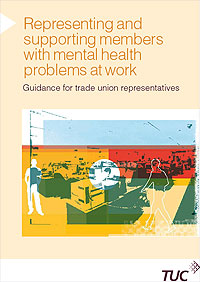TUC Calls For Better Support For Workers With Mental Health Problems
 The TUC has published new guidance to help employers and unions support people with mental health problems at work, in advance of the TUC's annual disability conference next week (21 and 22 May).
The TUC has published new guidance to help employers and unions support people with mental health problems at work, in advance of the TUC's annual disability conference next week (21 and 22 May).
Every organisation in Britain is affected by mental distress and ill health in the workplace, and at any given time one in six workers will experience depression, anxiety, or stress-related problems. Simple steps - including the prevention and early identification of mental health problems - can promote the mental well-being of staff and help employers save money by cutting down on days lost to sick leave.
TUC General Secretary Brendan Barber said: "Hundreds and thousands of people at work face ignorance, prejudice and stigma because of mental health problems. Even more - who are both able and willing to work - cannot get a job because of discrimination by employers, even though this is illegal under the Disability Discrimination Act.
This report provides union reps with the information they need to help people with mental health problems keep their jobs and develop their careers. It will help unions work out how to make adjustments in the workplace for people with these health problems, and help employers keep their valuable and skilled staff."
The report, produced with Disability Forward Ltd, recommends that unions work with employers to encourage job applications from people with mental health issues and that they urge individuals to disclose any mental health problems they may have.
The report - Representing and supporting members with mental health problems at work - can be downloaded from the TUC here
Other things unions can do to ensure workplaces are supportive include:
-
Ensuring that as many reps as possible have had training on mental health at work.
-
Training mental health champions, who have a more thorough understanding of mental health problems and know about how people can be better supported in the working environment.
-
Networking with other unions to share knowledge and good practice.
-
Reviewing policies and procedures to ensure they are not discriminating against members with mental health problems.
-
Supporting employers to set up internal or external support meetings with people with mental health problems so that concerns and recommendations can be reported to managers.
-
Encouraging employers to set up a formal Employee Assistance Programme (EAP), where individuals can receive counselling and advice.
Source: TUC

